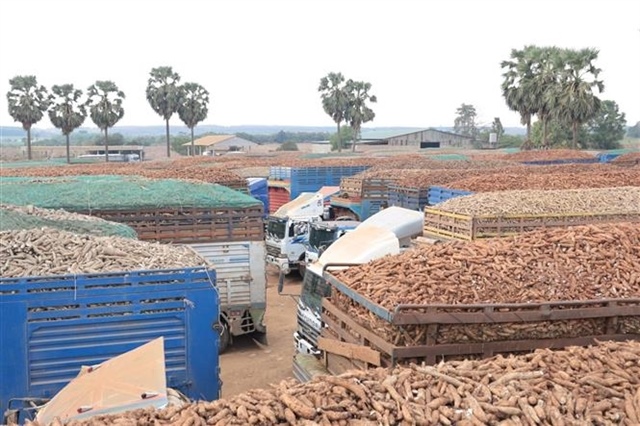Vietnamese firms display fashion products at Hong Kong fair
Vietnamese firms display fashion products at Hong Kong fair
Thirty-five leading manufacturers of handicrafts, garments, textiles, and fashion accessories and garment-related industries in Viet Nam are displaying their products at an international fair in Hong Kong that opened on Saturday.

Global Sources Fashion, Hong Kong’s largest fashion sourcing event, also showcases footwear, fabrics and underwear.
The event features verified suppliers from major fashion manufacturing hubs such as Việt Nam, China, Hong Kong, Taiwan, South Korea, Bangladesh, India, and Indonesia.
This year 10 manufacturers from the Handicraft and Wood Industry Association of HCM City are participating in the trade show, according to the organiser.
Vietnamese exhibitors are also taking part in the Rising and Young Designers Corner, a programme showcasing designs by emerging talents and start-ups from Viet Nam and other countries like India, Laos, the Philippines, Nepal, and Kenya and host Hong Kong.
Thousands of top buyers are expected to attend the show, including Adidas, Avery Dennison, AYE AYE, Colette, eBay, Fossil, GAP, Marubeni, and Mothercare.
Pham Thiet Hoa, director of HCM City’s Investment and Trade Promotion Centre (ITPC), said Viet Nam has become a more attractive complementary garment-sourcing destination for international buyers.
The ITPC is supporting most of the Vietnamese participants as part of its mission to assist HCM City enterprises and attract foreign investment to Viet Nam, he said.
With around 1,800 booths, the fair is expected to welcome 12,000 buyers from 150 countries and territories, including the US, the EU, Hong Kong, and Japan.
Other highlights include conference programmes where industry experts share fashion trends and new technology applications such as AI and 3D printing in the fashion industry.
Viet Nam as manufacture of the world
“Vietnamese garment, fashion accessories and home products firms could take advantage of US’s high tariff on Chinese exports to boost their exports to the US," Hòa, director of ITPC, told Viet Nam News.
Many of China-made products like garments, bags and furniture have become 10 per cent more expensive when exporting to the US, and this could rise to 25 per cent next year, he said.
“For mutual trade benefit, Vietnamese exporters need to enhance export standards, product quality, and trade communications skills.”
Vu Ngoc Khiem, chief representative of Global Sources, said an increasing number of overseas buyers are sourcing products from Viet Nam as the country is rapidly improving its supply chain for locally made garments and taking part in more free trade agreements.
Michael Hung, general manager of Headwind Group, a Hong Kong-based buyer of promotional caps, apparels and toys, said, “Viet Nam offers a unique manufacturing opportunity for importers.”
However, “There are a number of logistics constraints Viet Nam faces that make it more challenging than, let’s say, China. But if you can work through this issue, it can be highly rewarding.”
Viet Nam has been trying to strengthen its current role as the manufacturer of many of the world’s established brands.
The last decade saw steady growth in its garment and textile exports to Europe and North America.
Garments topped the export list last year with record shipments of US$31 billion following a rise of 19.2 per cent, according to statistics from the Viet Nam Textile and Apparel Association.
Garment exports to China last year also surpassed the $1 billion mark, expanding the market beyond Viet Nam’s traditional ones like ASEAN member countries, Eastern Europe, the EU, Japan, and South Korea.
The export target has been set at more than $35 billion this year and $40 billion next year, according to the Viet Nam National Garment and Textile Group.
However, the US withdrawal from the Trans-Pacific Partnership could affect Viet Nam, experts have warned.
Exports to the members of the Comprehensive and Progressive Agreement for Trans-Pacific Partnership (CPTPP) accounted for 17.1 per cent of Viet Nam’s overall exports, according to the General Department of Viet Nam Customs.
CPTPP is expected to take effect in early 2019 and to open up great opportunities for the sector.





















